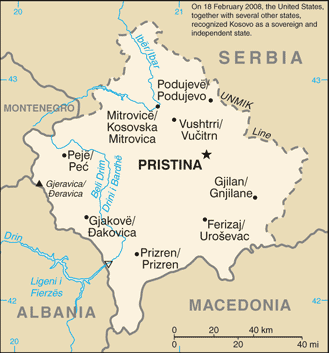15 years ago today marked the beginning of “Operation Noble Anvil,” the US and NATO bombing campaign against Yugoslavia that left around 500 civilians dead and imposed the secession of Kosovo from the rest of Serbia.
 The decision to attack Yugoslavia without UN authorization, and the decision to separate Kosovo along a line that forced several Serbian towns out of Serbia and into the role of ethnic minority in a new Kosovo have been sources of considerable tension in the region.
The decision to attack Yugoslavia without UN authorization, and the decision to separate Kosovo along a line that forced several Serbian towns out of Serbia and into the role of ethnic minority in a new Kosovo have been sources of considerable tension in the region.
NATO continues to have troops in Kosovo primarily to tamp down the secessionist sentiment among the northern Serbs, and to keep them from trading with and traveling to neighboring Serbia.
The territorial dispute continues to be a thorn in the side of Serbian relations with NATO and the EU, and Kosovo’s recognition internationally has been a struggle, primarily because of how it was created.
The forced secession in Kosovo and the lingering tensions are particularly timely with the secession and accession of Crimea from Ukraine into Russia. While NATO insisted their own deadly imposition of secession in Kosovo was perfectly legal, NATO officials angrily condemned the secession vote in Crimea, and have vowed to never recognize the results.


